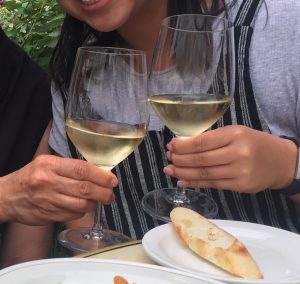
By Rev. Ken Yamada
It seemed surreal: disco music, balloons, dinner buffet and cocktails aplenty. It was a “Celebration of Life” for a recently departed friend.
Don’t get me wrong. I’m all for meeting friends, sharing memories and honoring a loved one who just died. But as a religious person, I didn’t know what to expect. What happens, what do I do, and how am I supposed to feel?
As a Buddhist minister, I’ve performed countless funerals and memorials typically in a temple or funeral home, involving a solemn period of chanting, incense offering, speeches, tears and flowers. I understand people these days don’t like traditional funerals and think focusing on death is depressing. They would rather focus on “life.” I get it.
Thus, the evening flowed. In the banquet hall, we ate, drank, talked and laughed. Old friends met, hugged and reminisced. A slideshow brought back memories of younger days. It began to resemble a high school reunion. I wondered, is this all?
The deceased’s brother approached our table. He thanked us for coming, exchanged pleasantries. After introductions, more small talk. Before moving on, he said, “Yeah, her illness was tough. We thought she was getting better, and she was! Then it got worse. The cancer spread all over her body. She was in pain. At the end, she couldn’t even get out of bed.” He smiled, told us to enjoy ourselves, and walked away.
I was emotionally sucker-punched in the gut. Our table fell silent. A woman next to me began to weep.
The speeches began. Mostly reminiscing, words of praise, expressions of love. Only one vaguely religious thought from somebody who said, “I know she’s happy and looking down at us right now.”
Frankly, I was confused. How was I supposed to feel? Happy or sad? My friend died in the prime of her life. Her death was tragic. Her suffering was our suffering. How could we celebrate?
At least it was something. We came together, shared a meal and memories, and honored her. I’m glad I went.
Nowadays, there’s a trend towards more celebrations and fewer funerals. Professional celebration of life “planners” promise to put the “fun” in funerals—golf course outings, country club banquets and bay cruises. I’ve also known cases where nothing was done at the deceased’s last request, leaving family and friends feeling a lack of closure.
All of which begs the question: Is religion still necessary in people’s lives?
Toasting to a recently deceased friend is nice but from a Buddhist perspective, our worldview stays the same. We go back to our daily lives without any deeper understanding of life and death. I think that’s a lost opportunity. Confronting a loved one’s death is perhaps the most painful experience we face. It’s a time when important questions slap us in the face, and it’s a time when answers lay within our reach.
To clarify, Buddhist memorial services aren’t conducted for the deceased’s benefit, to somehow send a person to the Pure Land. Rather, it’s a time to remember and honor a person, and also a way to express our appreciation. But there’s a larger purpose.
A Buddhist funeral or memorial service—or any Buddhist service for that matter—is an opportunity to awaken to the true meaning of life through the Buddha dharma. “Buddha” means “awakened” and “dharma” means truth. The Buddha dharma is a path that leads us to awaken to truth.
At a Buddhist funeral or memorial service, we may honor the deceased, remember and even celebrate their lives, but we also must acknowledge that we are confronting a great loss that has occurred. Within this loss lies a mix of feelings, including sadness, grief, frustration, fear, anger, and confusion. Moreover, we begin to question the meaning of our own lives and are reminded we too face our own mortality. It’s truly a crisis point in our lives.
In the story of Prince Siddhartha before he became the Buddha, he left his palace and witnessed a funeral, confronting death for the first time. Symbolically he crossed under the gate of death. This is one of the experiences that propelled him onto a spiritual path. It’s also an experience that can lead us to a spiritual path.
In Buddhism, any service is an opportunity to hear the Buddha dharma, the Buddhist teachings. We are asked to reflect on our lives and deepen our understanding of who we are and what this life is all about. We follow this path in our Jodo Shinshu tradition through our rituals and chanting, and especially by hearing dharma talks. We are reminded of the truth of impermanence. We are encouraged to see life and death as part of a whole Life. Our everyday thinking is challenged. This is where “celebrations” fall far short.
By shifting our perspective, we gain a new way of seeing the world. By understanding and through wisdom, we feel a sense of appreciation and gratitude, expressed through our rituals and tradition, and which we feel in our hearts.
Ultimately this service—and our entire Buddhist tradition—represent a path meant to transform the way we see the world, and in this case, the way we see death. Through our loved one’s death, we hope to understand impermanence, interdependence, our connection to each other and ultimately the Oneness of Life. No celebrations necessary. Just follow the path.
Rev. Ken Yamada is editor of Shinshu Center of America

